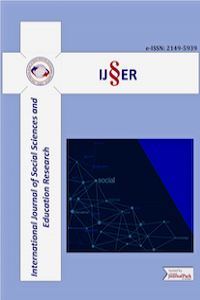Water scarcity as a global public dilemma: Public fiscal policies towards rainwater harvesting
Factors such as population growth rate, industrialization, increase in urbanization rate, unplanned urbanization, consumption of pesticides, climate change, which are experienced during the history of mankind, cause environmental pollution affecting future generations especially water resources. This situation, which constitutes a global public problem in today's world, has particularly reached threatening levels for usable/potable water resources. Under the prediction that the world will face 40% water scarcity by 2030, it is important that the rainwater will be stored and made usable. The article includes the applied fiscal policies around the world (e.g. public standards/practices, public incentive policies, output/result-oriented policies). The article presents the current situation in Turkey and suggests the legal regulation.
___
- Akgün, I. (2012). Dünyada ve Türkiye'de alternatif su yönetimi arayışları ve öneriler (Alternative water management seeking and suggestion in the World and Turkey). Retrieved from PAD website: www.pad.org.tr/sunumlar/akgun-ilhan-dunyada-ve-turkiyede-alternatif.pdf.
- Che-Ani, A.I., Shaari, N., Sairi, A., Zain, M.F.M., & Tahir, M.M. (2009), Rainwater Harvesting as an alternative water supply in the future. European Journal of Scientific Research. Vol. 34, No. 1: 132-140.
- Food and Agriculture Organization of the United Nations (2012). Coping with water scarcity An action framework for agriculture and food security. Rome: FAO Water Reports 38.
- Gavas, M., Koch, S., Bello, O., Seters, J.V., Furness, M. (2011). The EU's Multi-Annual Financial Framework Post-2013: Options for EU Development Cooperation. European Think-Tanks Group, 2011. Retrieved from related website: www.die-gdi.de/uploads/media/Garvas_et_al.pdf.
- Global Water Partnership Central and Easter Europe (2015). Guidelines for the preparation of Drought Management Plans. Development and implementation in the context of the EU Water Framework Directive, Global Water Partnership Central and Eastern Europe.
- Grasso, M. (2004). Climate change: the global public good. Retrieved from related website: http://econwpa.repec.org/eps/othr/papers/0405/0405010.pdf.
- Gupta, V., & Naidu, C.K. (2015). Me 'n' Mine - Social Science : A Complete Practice Material, India: New Saraswati House.
- Gurjar, E. (2012). Rainwater Harvesting as Government's Public Policy Decision, Legal Articles.
- Jones, B. (2014). What are the advantages and disadvantages of rainwater harvesting? A breakdown of the various advantages and disadvantages of rainwater harvesting. The Green Home. Retrieved from related website: http://thegreenhome.co.uk/heating-renewables/advantages-and-disadvantages-of-rainwater-harvesting/.
- Kaul, I.,Grunberg, I., & Stern, M. A. (1999). Defining global public goods. In I. Kaul, L. Goulven, M. A. Stern, (Eds.), Global Public Goods: International Cooperation in the 21st Century (2-19).New York: Oxford University Press.
- Kaul, I., Conceıção, P., Goulven, K.L., & Mendoza, R. U. (2003). How to Improve the Provision of Global Public Goods. In I. Kaul, P. Conceıçao, K.L. Goulven, & R.U. Mendoza (Eds.) Providing Global Public Goods-Managing Globalization, New York: Oxford University Pres.
- Kok, M., Brons, J., & Witmer, M. (2011). A global public goods perspective on environment and poverty reduction. Implications for Dutch foreign policy. PBL Netherlands Environmental Assessment Agency. The Hague. PBL No: 555075001.
- Mohd. Shahwahid, H.O., Suhaimi, A.R., Rasyikah, M.K., Jamaluddin, S.A., Huang, Y.F., & Farah, M.S. (2007). Policies and incentives for rainwater harvesting in Malaysia. Paper presented at Rainwater Utilization Colloquium on 19&20 April 2007 at NAHRIM Mini Auditorium.
- Qadir, M., Sharma, B.R., Bruggeman, A., Choukr-Allah, R., & Karajeh, F. (2007). Non-conventional water resources and opportunities for water augmentation to achieve food security in water scarce countries. Agricultural Water Management 87(2007): 2-22.
- Sterren, M. van der, Rahman, A., & Dennis, G.R. (2012). Rainwater harvesting systems in Australia. Ecological Water Quality - Water Treatment and Reuse. InTech. DOI: 10.5772/1070.
- Taylor, N. (2013). Thematic programme on global public goods and challenges 2014-20. Third Interim Meeting of the Policy Forum on Development. Brussels, 18-19 June 2013.
- TUBITAK (2011). Ulusal Su Ar-Ge ve Yenilik Stratejisi (National Water R&D and Innovation Strategy). Ankara.
- Uitoo, J.I. (2016). Evaluating the environment as a global public good. Evaluation. Vol. 22 (1). 108-115.
- UN-Water (2006). Coping With Water Scarcity - A strategic issue and priority for system-wide action. UN-Water Thematic Initiatives. August 2006.
- UN-Water (2013). Water security & the global water agenda a Un-Water analytical brief. Canada: United Nations University.
- Withanage, H. Water; an economic good or a Public good. Retrieved from < www.elaw.org/system/files/sri+lanka.water+a+public+good.doc> (10.04.2017).
- World Economic Forum (2015). Global Risks Perception Survey 2015, WEF Press.
- Yayın Aralığı: Yılda 4 Sayı
- Başlangıç: 2015
- Yayıncı: Mahmut DEMİR
Sayıdaki Diğer Makaleler
Ulus inşa sürecinde kullanılan iletişim stratejileri
Yeni kent ve konut biçimlerinin toplumsal iletişim zemininde eleştirel yorumu
Albert Camus’un saçma kavramı bağlamında Belleğin Kış Uykusu romanı
Erhan Türeli, Nesrin Şalvarcı Türeli
Mohamad Faisal Ahmad, Mohd İsa HAMZAH, Khadijah Abdul RAZAK, Maria MOHAMMAD
Maria MOHAMMAD, Md.nasir IBRAHİM, Mohamad Rusdi MOHD NASİR, Kasran JİDDİN, Mohamad Faisal AHMAD
